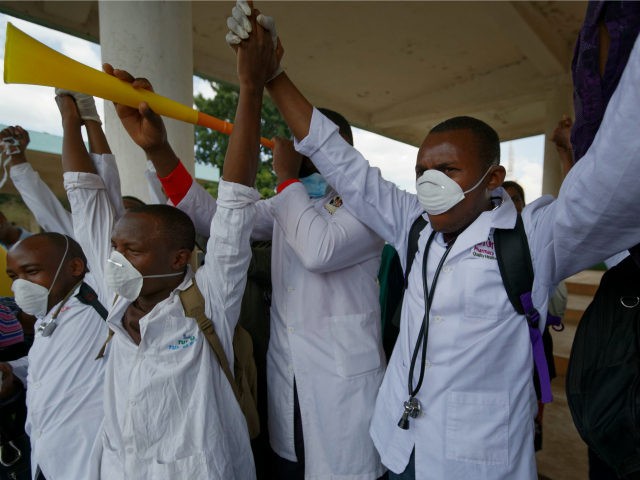Medical organizations in Kenya condemned a government plan Monday to import doctors from Cuba to address the nation’s vast shortage of medical professionals, citing that more than one thousand ready-to-work Kenyan doctors are still unemployed in the country.
The communist regime governing Cuba actively promotes its medical schools and uses doctors as diplomatic tools, trading them for cash and, in some cases, necessary goods, such as oil, while largely failing to pay the doctors, offering, instead, meager food “stipends.” Cuban doctors around the world have described their international work as “slavery”; in Brazil, over one hundred Cuban doctors sued to be freed from their draconian contracts and treated like all other international doctors in the country.
Kenyan President Uhuru Kenyatta announced the importation of one hundred Cuban doctors to the African nation this week, following a diplomatic visit to Havana.
“Kenya has 1,000 doctors who are not employed. They have waited for deployment since May 2017. There are additional specialists who have been waiting for deployment to counties. Is there room for these Drs in Kenya?” Ouma Oluga, the secretary general of the Kenya Medical Practitioners, Pharmacists and Dentists’ Union (KMPDU), said on Twitter Monday.
Oluga noted that Kenya also lost 700 doctors who left the country this year, while, “this year, we have no doctors who graduated.”
His deputy, Mwachonda Chibanzi, made a similar statement, acknowledging that Kenya has a “serious shortage of doctors countrywide.”
“The decision by the government to bring in doctors from Cuba should take into consideration the more than 1,200 Kenyan doctors currently unemployed since May 2017,” Chibanzi argued, according to Kenya’s the Star newspaper.
Speaking to the Daily Nation, Chibanzi argued that many of those unemployed doctors were recent graduates of Kenyan internship programs. The government has refused to hire them claiming insufficient funds to do so.
“There are consultants out of employment. They went for specialist training before devolution but the national government and devolved governments have refused to deploy them to counties,” he argued. “If the government wants to hire foreign doctors, Kenyan-trained ones should also be employed. It is the mandate of the government to create employment for citizens.”
The KMPDU may not authorize Cuban doctors to work in the country, which the Star notes will present a legal predicament for the doctors once they arrive in Kenya. The newspaper ads that the union has successfully blocked the government from importing doctors in the past; last year, a 100-day strike forced the cancellation of a plan to import Tanzanian doctors. The government did not, however, respond to the strike by hiring unemployed Kenyan doctors, instead.
According to the doctors’ union, Kenya is currently home to 2,400 foreign doctors, most from Egypt, India, and Pakistan. Doctors from neighboring countries like Rwanda and Congo are also part of the foreign medical force in the country. Using World Health Organization (WHO) figures for the number of medical professionals one doctor can tend to adequately, the KMPDU has found an alarming deficit of 34,445 doctors, according to the Star. Kenya has “only 4,344 doctors in the public sector serving an estimated population of 38.6 million Kenyans,” the newspaper notes.
The problem is significantly acuter when taking into account the need for specialist doctors. The Spanish newswire service EFE reports that Kenya has little more than 2,000 employed specialist doctors, among them only two in the country who can treat glaucoma, and small numbers for specialties like psychiatry and anesthesiology.
“With these numbers, we ask ourselves why the government imports doctors who practice internal medicine,” Oluga protested.
Kenyatta’s deal with the Castro regime would have 100 Cuban doctors imported into Kenya, two specialists per Kenyan county. Fifty Kenyan doctors would also travel to Cuba to receive specialization education.
The Star notes a significant discrepancy between what the government must pay Kenyan doctors versus what it can get away with paying a foreign one. According to the newspaper, a Kenyan doctor makes at least $15,000 a year, while an Indian doctor earns at least $3,000 a year doing the same work.
It is unclear how much the Kenyan government will pay Cuba for its doctors, but whatever that amount is, it is a guarantee that the doctors themselves will not see most of it. Cuba keeps 75 percent of a doctor’s salary, netting the Castro regime nearly $8 million a year. Doctors in Cuba make $67 a month, or $804 a year. Abroad, the receive only a “living stipend,” which doctors who have defected allege are barely enough to cover meals. In Brazil, the monthly doctor salary was $927, but they were working unreasonable hours, leaving their families behind, and having no freedom of movement within Brazil.
“When you leave Cuba for the first time, you discover many things you were blinded to until that moment,” a Cuban doctor in Brazil told the New York Times. “You get tired of being a slave.”
The New York Times has opposed attempts to help Cuban doctors achieve freedom by the U.S. government.
In Brazil, 150 Cuban doctors sued the government to be freed from their unreasonable work contracts. The litigation remains pending.
In addition to growing awareness of the injustice surrounding the Cuban slave doctor program, the Castro regime has had to contend with growing awareness of what the Miami Herald described in 2013 as “a rapid and consistent deterioration in the level of academic quality on the island of medical students.” That year, Brazilian government statistics revealed that most Cuban doctors seeking medical licensing in the South American country failed to meet Brazil’s standards.
In 2015, the Pacific island nation of Tuvalu announced that its plan to send local doctors to train in Cuba, much like Kenya’s plan, was a failure, as the doctors returned with a poor grasp of even the most basic medical skills. Tuvalu announced that it would, instead, seek to send its doctors to neighboring Kiribati for superior training.

COMMENTS
Please let us know if you're having issues with commenting.